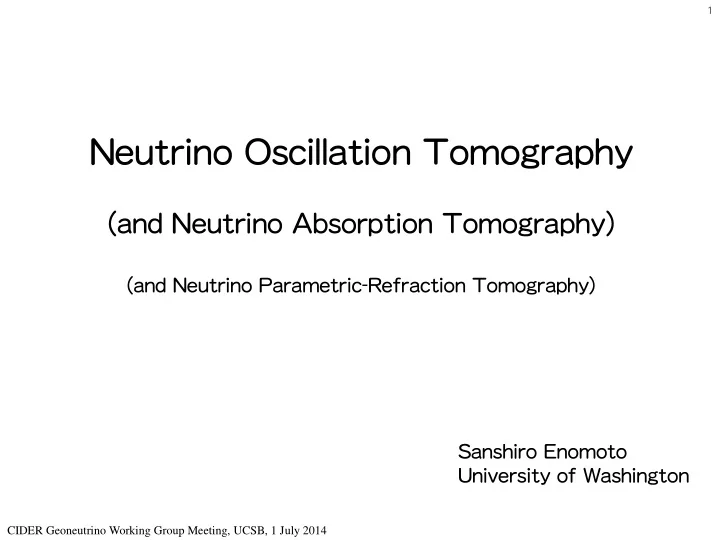

1 Neutrino Oscillation Tomography (and Neutrino Absorption Tomography) (and Neutrino Parametric-Refraction Tomography) Sanshiro Enomoto University of Washington CIDER Geoneutrino Working Group Meeting, UCSB, 1 July 2014
2 Everything Shown Here was Taken from: and references in there
3 Atmospheric Neutrinos Super-Kamiokande in Japan (10 MeV ~ 100 GeV) primary cosmic ray (proton) 40 m 50 kt Ice Cube at South Pole (100 GeV ~ ) Deep-Core (10 GeV ~ ) Detection by Charged-Current 0.02 ν µ + → µ − + N X 1000 m km 3 1 km 3
4 Atmospheric Neutrinos and Neutrino Oscillation Probability of detecting ν μ after distance L L / km − ν → ν ≈ × ⋅ 2 3 ( ) 1 - sin 3 10 P µ µ E / GeV ν (w/o matter effects) µ ν ν τ e Energy (GeV) Survival Probability 10 GeV Zenith Angle ⇒ Distance
5 Oscillation Tomography using Matter Effect Neutrino oscillation is affected by Electron Density D. R. Grant, Neutrino 2014
6 Neutrino Oscillation though Earth ν → ν − ν → ν − P ( ) Normal Hierarchy P ( ) Inverted Hierarchy µ µ µ µ ν → ν − ν → ν − ~ ( ) IH ~ ( ) NH P P µ µ µ µ Energy (GeV) Energy (GeV) Survival Probability Survival Probability 10 GeV cos(zenith angle) cos(zenith angle) Core
7 Neutrino Oscillation though Earth ν → ν − ν → ν − P ( ) Normal Hierarchy P ( ) Inverted Hierarchy µ µ µ µ ν → ν − ν → ν − ~ ( ) IH ~ ( ) NH P P µ µ µ µ Energy (GeV) Energy (GeV) Survival Probability Survival Probability MSW Resonance Parametric on θ 13 & Enhancement (adiabatic) (non-adiabatic) 10 GeV cos(zenith angle) cos(zenith angle) Core
8 Neutrino Oscillation though Earth ν → ν − ν → ν − P ( ) Normal Hierarchy P ( ) Inverted Hierarchy µ µ µ µ ν → ν − ν → ν − ~ ( ) IH ~ ( ) NH P P µ µ µ µ Energy (GeV) Energy (GeV) Survival Probability Survival Probability MSW Resonance Parametric on θ 13 & Enhancement (adiabatic) (non-adiabatic) 10 GeV cos(zenith angle) cos(zenith angle) Core
9 Neutrino Oscillation though Earth ν → ν − ν → ν − P ( ) Normal Hierarchy P ( ) Inverted Hierarchy µ µ µ µ ν → ν − ν → ν − ~ ( ) IH ~ ( ) NH P P µ µ µ µ Energy (GeV) Energy (GeV) Survival Probability Survival Probability MSW Resonance Parametric on θ 13 & Enhancement (adiabatic) (non-adiabatic) 10 GeV cos(zenith angle) cos(zenith angle) Core
10 Sensitivity to Core Z/A If Density is known, electron density gives Z/A ratio Z/A Ratio: Hydrogen: 1 Light Elements: 0.5 Mantle (Pyrolite): 0.4957 6.5% difference Iron: 0.4656 Iron Core (Z/A=0.4656) Pyrolite (Z/A=0.4957) Normal Hierarchy
11 Wish List Atmospheric Neutrino Flux Gigantic Detector (~ Mega ton) Dense Detector (~1 GeV threshold) Good Energy and Angular Sensitivity Normal Hierarchy Preferred (antineutrino cross-section is smaller) Neutrino Charged-Current Cross-section • Ice-Cube is too sparse (Deep-Core detects E >10GeV) • Super-Kamiokande is too small (total 50 k-ton )
12 PINGU: Ice-Cube Upgrade for Lower Energy arXiv:1401.2046 (9 Jan 2014) ~3 M-ton effective volume x20 photo cathode density sensitivity downto few GeV $100M, ready in ~5 years
13 Hyper-Kamiokande (Super-K successor) 0.99 M-ton 20% photo coverage arXiv:1109.3262 (15 Sep 2011) few MeV threshold
14 PINGU: Sensitivity to Core Z/A Pyrolite Iron Core Difference in ν μ Survival Probability Normal Hierarchy • PINGU volume (40 string) • PINGU energy resolution (ΔE/E = 0.33) • PINGU angular resolution (Δθ=15°) • PINGU systematic errors Difference in Number of Events 0.20 Normal Hierarchy 0.45 Inverted Hierarchy 1 yr 1 yr 0 0 -0.45 -0.20
15 PINGU: Sensitivity to Core Z/A PINGU 5 yr Fe: 0.4656 Pyrolite: 0.4957 (+6.5% to all-Fe)
16 PINGU: Sensitivity to Core Z/A PINGU 5 yr Fe: 0.4656 Pyrolite: 0.4957 (+6.5% to all-Fe) Fe + H (1 wt%): 0.4709 (+1.0% to all-Fe)
17 PINGU: Sensitivity to Core Z/A Pyrolite model can be tested at 1σ after 5 years (Normal Hierarchy) Inverted Hierarchy will limit the sensitivity to ~20%, “because antineutrino cross-section is half of neutrinos”... Dependence on θ 13 value is small Better energy resolution will largely improve the sensitivity
18 Hyper-Kamiokande might do it better Better energy and angular resolutions 50 m ν e channel usable HK: 1 M-ton water cherenkov • Smaller active volume?? PINGU Hyper-Kamiokande
19 Low-energy sensitivity increases effective volume Hyper-Kamiokande Letter of Intent arXiv:1109.3262 (15 Sep 2011) PINGU Partially-Contained Event μ ν μ
20 Neutrino Absorption Tomography Kotoyo Hoshina, AGU Fall 2012
21 Neutrino Absorption Tomography Kotoyo Hoshina, AGU Fall 2012
22 Neutrino Absorption Tomography Kotoyo Hoshina, AGU Fall 2012
23 Neutrino Absorption Tomography Kotoyo Hoshina, AGU Fall 2012
Appendix: 24 Parametric Enhancement is Sensitive to CMB? Energy (GeV) Survival Probability MSW Resonance Parametric on θ 13 & Enhancement (adiabatic) (non-adiabatic) 10 GeV Transition probability depends on structures of density step cos(zenith angle) Core
25 Summary • Neutrino Oscillation Tomography – Direct measurement of core composition – Uses oscillation matter effect (MSW) at 1~10 GeV – PINGU will measure Z/A at ~8% accuracy (NH case), possibly better – Inverted hierarchy will limit the sensitivity to ~20% – Hyper-Kamiokande might be able to do it better – ORCA (KM3NeT, 1.8 M-ton in sea water) can do the same? • Neutrino Absorption Tomography – Direct measurement of core density – Uses neutrino absorption at ~10 TeV – 10 yr Ice-Cube will discriminate core from mantle
26 Back Up
27 Photo Coverage vs Energy Threshold D. R. Grant, Neutrino 2014
28 MSW Resonance antineutrinos neutrinos
29 Atmospheric Neutrino Composition M. Honda et al, Phys Rev D 70, 043008 (2004)
Recommend
More recommend